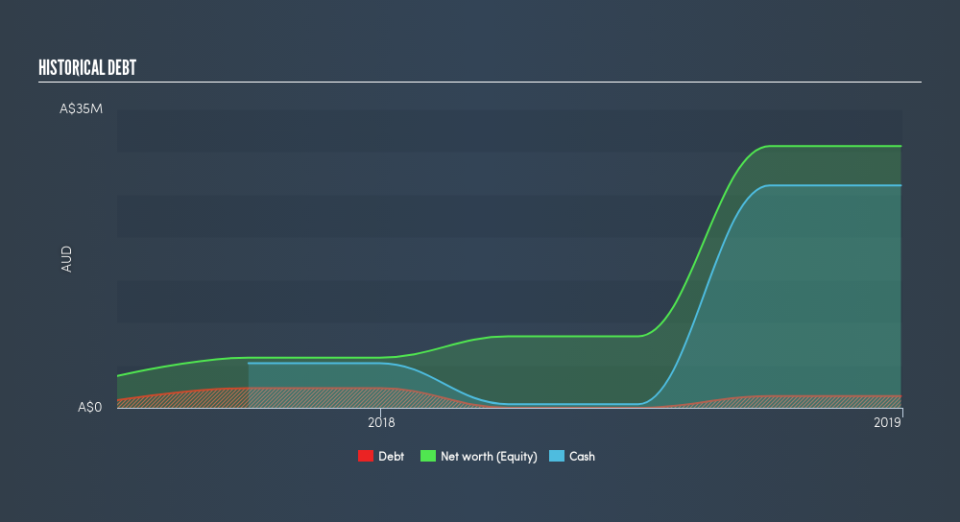Primero Group (ASX:PGX) Seems To Use Debt Rather Sparingly

Legendary fund manager Li Lu (who Charlie Munger backed) once said, 'The biggest investment risk is not the volatility of prices, but whether you will suffer a permanent loss of capital.' When we think about how risky a company is, we always like to look at its use of debt, since debt overload can lead to ruin. As with many other companies Primero Group Limited (ASX:PGX) makes use of debt. But is this debt a concern to shareholders?
Why Does Debt Bring Risk?
Debt assists a business until the business has trouble paying it off, either with new capital or with free cash flow. Ultimately, if the company can't fulfill its legal obligations to repay debt, shareholders could walk away with nothing. However, a more common (but still painful) scenario is that it has to raise new equity capital at a low price, thus permanently diluting shareholders. By replacing dilution, though, debt can be an extremely good tool for businesses that need capital to invest in growth at high rates of return. The first thing to do when considering how much debt a business uses is to look at its cash and debt together.
Check out our latest analysis for Primero Group
How Much Debt Does Primero Group Carry?
The image below, which you can click on for greater detail, shows that Primero Group had debt of AU$517.0k at the end of December 2018, a reduction from AU$2.32m over a year. But it also has AU$26.1m in cash to offset that, meaning it has AU$25.6m net cash.
How Healthy Is Primero Group's Balance Sheet?
We can see from the most recent balance sheet that Primero Group had liabilities of AU$30.1m falling due within a year, and liabilities of AU$2.49m due beyond that. Offsetting this, it had AU$26.1m in cash and AU$24.4m in receivables that were due within 12 months. So it actually has AU$17.8m more liquid assets than total liabilities.
This surplus suggests that Primero Group is using debt in a way that is appears to be both safe and conservative. Due to its strong net asset position, it is not likely to face issues with its lenders. Succinctly put, Primero Group boasts net cash, so it's fair to say it does not have a heavy debt load!
Even more impressive was the fact that Primero Group grew its EBIT by 102% over twelve months. That boost will make it even easier to pay down debt going forward. There's no doubt that we learn most about debt from the balance sheet. But ultimately the future profitability of the business will decide if Primero Group can strengthen its balance sheet over time. So if you want to see what the professionals think, you might find this free report on analyst profit forecasts to be interesting.
Finally, while the tax-man may adore accounting profits, lenders only accept cold hard cash. While Primero Group has net cash on its balance sheet, it's still worth taking a look at its ability to convert earnings before interest and tax (EBIT) to free cash flow, to help us understand how quickly it is building (or eroding) that cash balance. In the last three years, Primero Group's free cash flow amounted to 47% of its EBIT, less than we'd expect. That weak cash conversion makes it more difficult to handle indebtedness.
Summing up
While we empathize with investors who find debt concerning, you should keep in mind that Primero Group has net cash of AU$26m, as well as more liquid assets than liabilities. And it impressed us with its EBIT growth of 102% over the last year. So we don't think Primero Group's use of debt is risky. Above most other metrics, we think its important to track how fast earnings per share is growing, if at all. If you've also come to that realization, you're in luck, because today you can view this interactive graph of Primero Group's earnings per share history for free.
If you're interested in investing in businesses that can grow profits without the burden of debt, then check out this free list of growing businesses that have net cash on the balance sheet.
We aim to bring you long-term focused research analysis driven by fundamental data. Note that our analysis may not factor in the latest price-sensitive company announcements or qualitative material.
If you spot an error that warrants correction, please contact the editor at editorial-team@simplywallst.com. This article by Simply Wall St is general in nature. It does not constitute a recommendation to buy or sell any stock, and does not take account of your objectives, or your financial situation. Simply Wall St has no position in the stocks mentioned. Thank you for reading.

